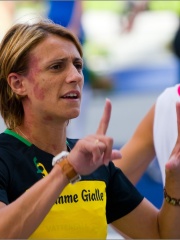Athlete
Maurizio Randazzo
1964 - today

 Maurizio Randazzo
Maurizio Randazzo
His biography is available in 14 different languages on Wikipedia. Maurizio Randazzo is the 3,461st most popular athlete, the 4,694th most popular biography from Italy and the 134th most popular Italian Athlete.
Maurizio Randazzo, born in 1964, is most famous for being an accomplished Italian fencer who has competed in multiple international competitions, including the Olympics. He is known for his expertise in the foil discipline.
Memorability Metrics
Page views of Maurizio Randazzo by language
Among Athletes
Among athletes, Maurizio Randazzo ranks 3,461 out of 6,025. Before him are Axel Kühn, Birte Siech, Carsten Embach, Yelena Belevskaya, Troy Kemp, and Paul Ereng. After him are Liliana Gafencu, Magomed Ibragimov, Tomasz Sikora, Mark Kirchner, Barrie Mabbott, and Qin Dongya.
Most Popular Athletes in Wikipedia
Go to all RankingsAxel Kühn
1967 - Present
HPI: 45.07
Rank: 3,455
Birte Siech
1967 - Present
HPI: 45.07
Rank: 3,456
Carsten Embach
1968 - Present
HPI: 45.06
Rank: 3,457
Yelena Belevskaya
1963 - Present
HPI: 45.05
Rank: 3,458
Troy Kemp
1966 - Present
HPI: 45.05
Rank: 3,459
Paul Ereng
1966 - Present
HPI: 45.05
Rank: 3,460
Maurizio Randazzo
1964 - Present
HPI: 45.04
Rank: 3,461
Liliana Gafencu
1975 - Present
HPI: 45.04
Rank: 3,462
Magomed Ibragimov
HPI: 45.03
Rank: 3,463
Tomasz Sikora
1973 - Present
HPI: 45.03
Rank: 3,464
Mark Kirchner
1970 - Present
HPI: 45.03
Rank: 3,465
Barrie Mabbott
1960 - Present
HPI: 45.02
Rank: 3,466
Qin Dongya
1978 - Present
HPI: 45.02
Rank: 3,467
Contemporaries
Among people born in 1964, Maurizio Randazzo ranks 931. Before him are Gerlinde Doberschütz, Petar Hubchev, Elisabeth Persson, Mikko Kolehmainen, Ursula Owusu, and Lesley Lokko. After him are Yoshinori Higashikawa, Roman Monchenko, Lotta Lotass, John Parrott, Feridun Zaimoğlu, and Paoletta Magoni.
Others Born in 1964
Go to all RankingsGerlinde Doberschütz
ATHLETE
1964 - Present
HPI: 45.23
Rank: 925
Petar Hubchev
SOCCER PLAYER
1964 - Present
HPI: 45.22
Rank: 926
Elisabeth Persson
ATHLETE
1964 - Present
HPI: 45.19
Rank: 927
Mikko Kolehmainen
ATHLETE
1964 - Present
HPI: 45.15
Rank: 928
Ursula Owusu
POLITICIAN
1964 - Present
HPI: 45.07
Rank: 929
Lesley Lokko
ARCHITECT
1964 - Present
HPI: 45.05
Rank: 930
Maurizio Randazzo
ATHLETE
1964 - Present
HPI: 45.04
Rank: 931
Yoshinori Higashikawa
SOCCER PLAYER
1964 - Present
HPI: 45.03
Rank: 932
Roman Monchenko
ATHLETE
1964 - 2020
HPI: 45.02
Rank: 933
Lotta Lotass
WRITER
1964 - Present
HPI: 44.99
Rank: 934
John Parrott
SNOOKER
1964 - Present
HPI: 44.99
Rank: 935
Feridun Zaimoğlu
WRITER
1964 - Present
HPI: 44.98
Rank: 936
Paoletta Magoni
SKIER
1964 - Present
HPI: 44.95
Rank: 937
In Italy
Among people born in Italy, Maurizio Randazzo ranks 4,695 out of NaN. Before him are Giovanni Tedesco (1972), Maurizio Milani (1961), Marzio Bruseghin (1974), Andrea Peron (1971), Roberto Fico (1974), and Patrick Cutrone (1998). After him are Matilda Lutz (1991), Serena Rossi (1985), Victoria De Angelis (2000), Paoletta Magoni (1964), Michele Frangilli (1976), and Sabina Valbusa (1972).
Others born in Italy
Go to all RankingsGiovanni Tedesco
SOCCER PLAYER
1972 - Present
HPI: 45.13
Rank: 4,689
Maurizio Milani
ACTOR
1961 - Present
HPI: 45.10
Rank: 4,690
Marzio Bruseghin
CYCLIST
1974 - Present
HPI: 45.07
Rank: 4,691
Andrea Peron
CYCLIST
1971 - Present
HPI: 45.06
Rank: 4,692
Roberto Fico
POLITICIAN
1974 - Present
HPI: 45.05
Rank: 4,693
Patrick Cutrone
SOCCER PLAYER
1998 - Present
HPI: 45.05
Rank: 4,694
Maurizio Randazzo
ATHLETE
1964 - Present
HPI: 45.04
Rank: 4,695
Matilda Lutz
ACTOR
1991 - Present
HPI: 45.01
Rank: 4,696
Serena Rossi
ACTOR
1985 - Present
HPI: 45.00
Rank: 4,697
Victoria De Angelis
MUSICIAN
2000 - Present
HPI: 44.97
Rank: 4,698
Paoletta Magoni
SKIER
1964 - Present
HPI: 44.95
Rank: 4,699
Michele Frangilli
ATHLETE
1976 - Present
HPI: 44.95
Rank: 4,700
Sabina Valbusa
SKIER
1972 - Present
HPI: 44.92
Rank: 4,701
Among Athletes In Italy
Among athletes born in Italy, Maurizio Randazzo ranks 134. Before him are Alessandro Lambruschini (1965), Gerda Weissensteiner (1969), Lucia Morico (1975), Antonietta Di Martino (1978), Alessandro Puccini (1968), and Stefano Tilli (1962). After him are Michele Frangilli (1976), Giovanni Pellielo (1970), Dominik Windisch (1989), Marco Galiazzo (1983), Thomas Green (null), and Annarita Sidoti (1969).
Alessandro Lambruschini
1965 - Present
HPI: 45.71
Rank: 128
Gerda Weissensteiner
1969 - Present
HPI: 45.48
Rank: 129
Lucia Morico
1975 - Present
HPI: 45.38
Rank: 130
Antonietta Di Martino
1978 - Present
HPI: 45.33
Rank: 131
Alessandro Puccini
1968 - Present
HPI: 45.31
Rank: 132
Stefano Tilli
1962 - Present
HPI: 45.21
Rank: 133
Maurizio Randazzo
1964 - Present
HPI: 45.04
Rank: 134
Michele Frangilli
1976 - Present
HPI: 44.95
Rank: 135
Giovanni Pellielo
1970 - Present
HPI: 44.72
Rank: 136
Dominik Windisch
1989 - Present
HPI: 44.65
Rank: 137
Marco Galiazzo
1983 - Present
HPI: 44.64
Rank: 138
Thomas Green
HPI: 44.63
Rank: 139
Annarita Sidoti
1969 - 2015
HPI: 44.43
Rank: 140














































